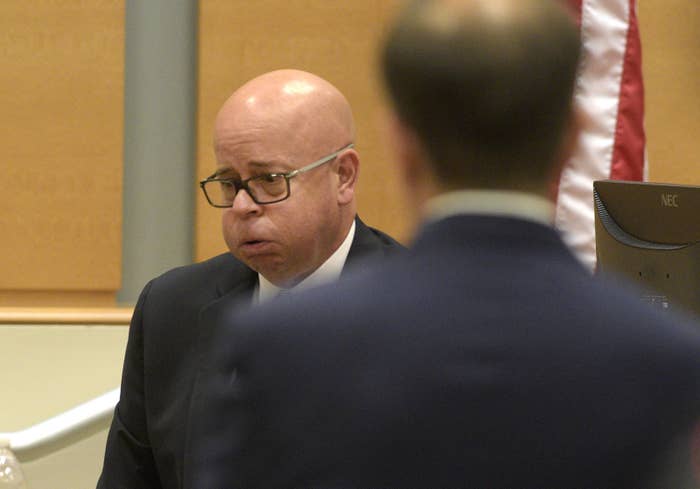
Attorneys for the plaintiffs — which include the surviving family members of eight victims of the 2012 Sandy Hook shooting and one FBI agent who was called to the scene moments after the tragedy occurred — and the defendant, Infowars founder and conspiracy theorist Alex Jones, concluded their opening statements in a Connecticut courtroom yesterday morning. The trial is to determine what damages Jones will have to pay for the default judgment of defamation previously found by Judge Barbara Bellis.
In the second defamation case brought by families against Jones, the plaintiffs said they have endured years of harassment, death threats, and denials that their loved ones — most of whom were children ages 6 and 7 — were actually killed during the shooting. Jones’s attorney argued that the families had become “partisans” in the aftermath of the tragedy and that they had “ulterior motives,” causing them to “exaggerate the harm that he caused them.” Essentially, Jones’s counsel, Norman Pattis, made the same argument that the radio show host has made on his program for years: that people are trying to take away the Second Amendment right to gun ownership and lying about gun violence to do so.
The plaintiffs' attorney, Chris Mattei, said in his opening statements that Jones “had to keep the lie going” for so many years because he profited from it. Mattei noted that in the days after the tragedy, traffic to Jones’s website — which also hosts a highly profitable web store — soared. The second-highest trafficked story from 2012 to 2019 on Infowars.com was “FBI Says Nobody Killed at Sandy Hook Massacre.”
In the days after the tragedy, traffic to Jones’s website — which also hosts a highly profitable web store — soared.
SWAT team FBI agent William Aldenberg testified first. He was at a training in Middletown, Connecticut, on Dec. 14, 2012, when the call came in for them to respond to a shooting.
Aldenberg is the only plaintiff who is not related to one of the victims of the shooting. He said he endured a harassment campaign that alleged he was one of the victim’s fathers, David Wheeler, who was present in court. At one point, Aldenberg, choking back tears, apologized to the man. “I’m sorry,” he said, “that’s the worst part, he suffered enough,” he said. He fought back tears several times as he recounted the short journey with “four or five” vehicles to the elementary school, saying that he had only known that there was an “active shooter” situation at a school at the time and only received the details when he arrived on the scene.
Upon arriving at the school, he said, “within 30 or 40 minutes of the shooting,” he encountered a “uniformed trooper” who was “being led away by a coworker or someone else, and he was like, in hysterics, and I thought, What the fuck? What’s going on?” He said it was “unusual” to see a law enforcement officer in such a state: “most law enforcement guys, they don’t get too emotional,” he said.
“I thought, What the fuck? What’s going on?”
Aldenberg described how almost immediately he was assigned to a team within the FBI to help surviving families deal with harassment, which began even before the funerals of the victims had happened. He also noted that his first assignment after the shooting itself was providing security at a church service for one of the victims.
Aldenberg went on to describe years of calls to his office at the FBI, his attempts to get help from his employers, and his fears for the safety of his family. “I’m not worried about myself,” he said more than once, reiterating his fears on behalf of his loved ones and the survivors.
On the morning of the shooting, Aldenberg testified, he was switching vests and had not finished doing so when the call came in. So he left for the school wearing his old vest, which did not have an FBI-identifying patch on its chest. Photographs that circulated widely in the media following the shooting showing Aldenberg and other agents as they walked, armed, into the school were the genesis of one particular conspiracy theory: that he and one of the victims’ fathers were the same person, and that he, Aldenberg, was not really an FBI agent. At one point, he claimed to bear some responsibility and guilt for the fact that, because he didn’t move fast enough that morning, the victim’s father had endured further abuse.
The second person to testify was Carlee Soto Parisi, the surviving younger sister of 27-year-old teacher Vicki Soto, who died in her classroom while trying to hide her students. Like Aldenberg, Soto Parisi described her experiences in the days, weeks, months, and years following the shooting. She described rushing to the school with her mother to try to locate her sister after hearing that there had been a shooting. Soto Parisi fought back tears as she identified her sister in a family photo. And she also described the experience of encountering strangers and even a former classmate wondering if the shooting was fabricated, suggesting for the plaintiffs how widely Jones’s theories had spread. Soto Parisi also said that, at times over the years, she has denied being related to her sister when asked in order to avoid potential confrontations.
As Soto Parisi ended her testimony on the first day of this trial what emerged as a theme was the extent to which each of the witnesses had endured not only their own tragedy but also the trauma, the plaintiffs' attorney argued, wrought by Jones’s fabrications about their losses. And subsequently it also seemed obvious that taking the stand to recount these life-changing, tragic events and devastating losses were retraumatizing.
Near the end of Aldenberg’s testimony, Mattei, the plaintiffs’ attorney, asked him to specify when he and the victims had stopped receiving threats and harassment. “It continued,” he said forcefully, seeming exasperated. “It’s gonna continue after today.” Jones’s attorney objected to the comment on the grounds that it was “speculative”; Aldenberg said, “It’s not speculative.” The judge sustained it.
